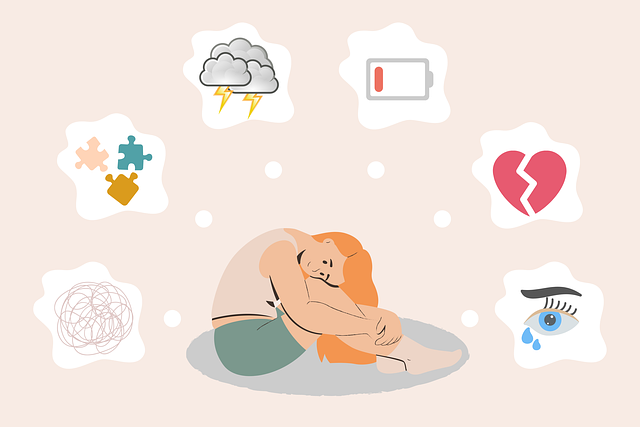Stress can worsen bipolar disorder symptoms, but recognizing personal triggers is key to managing it effectively. The Parker Bipolar Disorder Therapy approach combines cognitive-behavioral therapy (CBT), mindfulness practices, journaling, and structured self-care routines to combat stress and promote well-being. This holistic method focuses on self-awareness, emotional regulation, and resilience-building through personalized sessions, empowering individuals to maintain long-term emotional stability. Incorporating daily stress mitigation techniques like meditation and deep breathing, along with achievable goals, self-care, and tailored approaches, significantly enhances overall well-being.
“Stress management is a vital component of mental health care, especially for individuals living with bipolar disorder. In this article, we explore effective strategies for navigating stress and its impact on overall well-being. We delve into the Parker Bipolar Disorder Therapy Approach, a proven method that offers unique insights into managing stress. Additionally, discover practical daily techniques to mitigate stress and enhance resilience. By combining evidence-based practices with tailored strategies, individuals can take control of their mental health and embrace a more balanced life.”
- Understanding Stress and Its Impact on Mental Health
- The Parker Bipolar Disorder Therapy Approach to Stress Management
- Practical Techniques for Daily Stress Mitigation
Understanding Stress and Its Impact on Mental Health

Stress is a natural response to various life challenges and demands, but when left unmanaged, it can have significant effects on mental health. It’s essential to understand that stress doesn’t merely fade away; chronic or prolonged stress can lead to severe consequences, especially for individuals with pre-existing mental health conditions like bipolar disorder. The impact of persistent stress may manifest as heightened anxiety, mood swings, fatigue, and difficulty concentrating—symptoms that can exacerbate bipolar disorder symptoms.
Recognizing the signs and triggers of stress is a crucial first step in managing it effectively. This involves identifying personal stress factors, such as work pressure or relationship issues, and developing strategies to mitigate these stressors. The Parker Bipolar Disorder Therapy approach emphasizes emotional regulation techniques, including mindfulness practices and cognitive-behavioral therapies, which can empower individuals to cope with stressful situations healthily. Additionally, integrating mental wellness journaling exercises and establishing a structured self-care routine can significantly contribute to better mental health and overall well-being.
The Parker Bipolar Disorder Therapy Approach to Stress Management

The Parker Bipolar Disorder Therapy Approach to Stress Management offers a unique and effective method for individuals struggling with stress and its related conditions. This therapy is specifically tailored to address bipolar disorder, focusing on teaching clients coping mechanisms to manage intense emotions and reduce the frequency and severity of mood episodes. By integrating various evidence-based techniques, such as cognitive-behavioral therapy (CBT) and mindfulness practices, the approach aims to enhance emotional regulation skills.
This method emphasizes the importance of self-awareness and mental health education, empowering individuals to recognize early signs of stress or depression and implement immediate coping strategies. Through personalized sessions, clients gain tools to build resilience, boost confidence, and effectively navigate life’s challenges. The Parker Bipolar Disorder Therapy Approach also promotes a holistic understanding of mental well-being, encouraging participants to adopt healthier lifestyles that support their long-term emotional stability and overall well-being.
Practical Techniques for Daily Stress Mitigation

Incorporating daily stress mitigation techniques into your routine can significantly enhance overall well-being, particularly for individuals managing conditions like bipolar disorder. Simple yet effective practices such as mindfulness meditation and deep breathing exercises have been shown to reduce anxiety and stabilize mood. Starting the day with a brief meditation session or engaging in mindful activities like yoga or nature walks can create a sense of calm that carries over into other areas of life. These techniques are not only practical but also adaptable, allowing for personalized approaches tailored to individual needs.
For those navigating trauma or seeking self-esteem improvement, emotional healing processes play a crucial role in stress management. Engaging in psychotherapy, whether through traditional talk therapy or specialized services like Parker Bipolar Disorder Therapy, can provide valuable tools for coping with past experiences and building resilience. Additionally, setting achievable goals and practicing self-care—including adequate sleep, regular exercise, and balanced nutrition—are essential components of a holistic stress management strategy. Incorporating these practices into daily life not only supports emotional healing but also fosters a greater sense of control and overall well-being.
In understanding the profound impact of stress on mental health, this article has explored both theoretical and practical approaches to stress management. The Parker Bipolar Disorder Therapy approach stands out as a comprehensive framework, offering tailored strategies for navigating stress. By integrating these techniques into daily life, individuals can effectively mitigate stress levels and foster resilience. This holistic perspective on well-being encourages a proactive stance against stress, ultimately enhancing overall mental health and quality of life.










